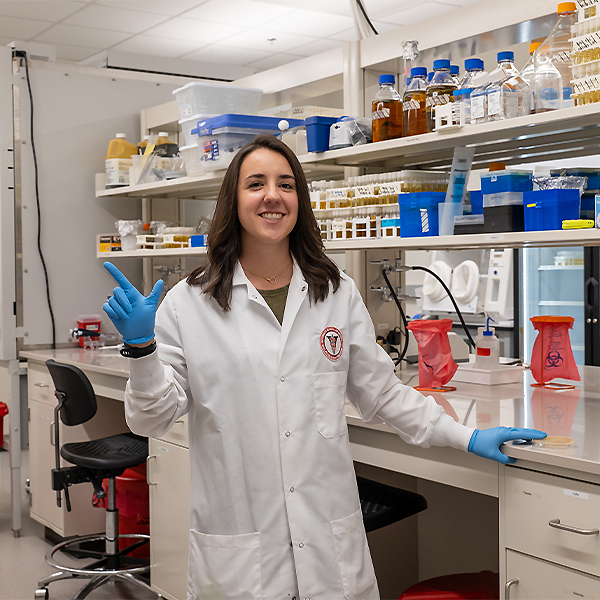
One Health Ph.D. student seeks opportunities to improve food safety for human, animal and ecosystem health.
For Mariana Fernandez, it’s the integration of science, curiosity and discovery that sparked her unrelenting passion to pursue One Health, the intersection of human, animal and ecosystem health. Her love for Texas Tech University and One Health research was a perfect combination that led her to be part of the inaugural class in the Texas Tech School of Veterinary Medicine’s innovative Ph.D. in One Health Sciences.
Fernandez grew up in Monterrey, Mexico, but at the age of eleven she moved with her family to the U.S. She began her undergrad at Texas State University but transferred to Texas Tech during her sophomore year.
Soon after, she received her bachelor’s degree in food science with a minor in chemistry. However, she desired to further her academic journey, so she stayed and pursued her master’s in food science and now she is on her way to completing her Ph.D. in One Health Sciences.
Fernandez’s life revolves around much more than just research and being a student. She also loves being surrounded by family and her friends and if she’s not around them, you can find her cooking or preparing for her next triathlon race.
Her fascinating story is what will lead her to make a great impact in the food safety industry. Let’s get to know Mariana Fernandez through a series of questions.
What are you passionate about in research?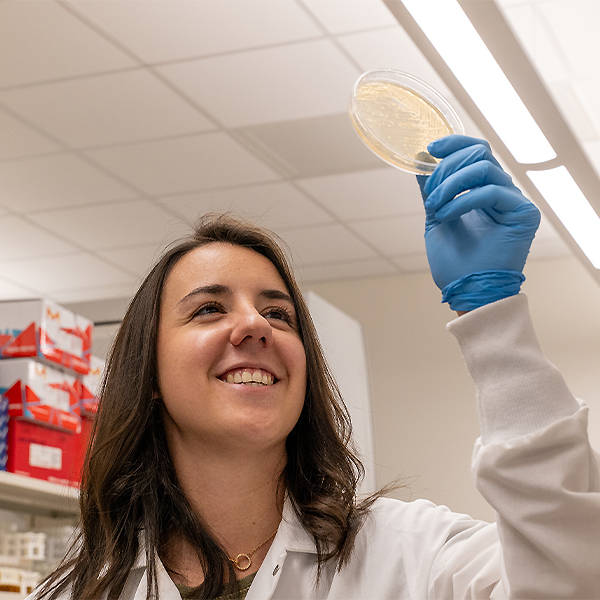
For me, my passion in research is about the process of discovery. I find that everything I learn in the process of planning and executing the experiments as well as analyzing data and collaborating with colleges are the skills that I take with me to every other project I do. This ultimately is what I believe will make me a better scientist.
This is also why it is wonderful to study One Health Sciences. One Health research embodies a commitment to understanding and addressing complex health challenges that transcend disciplinary boundaries. The thing that really inspires me about One Health is the realization that by working together with other scientist and learning from each other we can uncover novel solutions to global health issues. One Health is what helps us address some of the bigger issues in the world and empowers us to work together to create solutions.
How did you find your passion in research?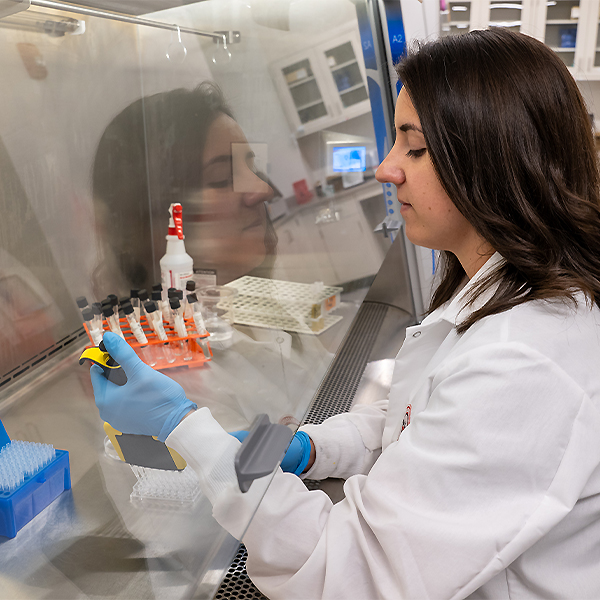
I’ve always loved science and curiosity. However, I think for me it was important to do something that had an impact. While I was an undergraduate at Texas Tech, I started working in the food microbiology lab in the Experimental Sciences Building on Texas Tech’s campus. This is where I had the opportunity to assist in many graduate student-led projects as well as leading one of my own.
Being part of other projects really opened my mind to how broad food safety can be and how many different approaches one can take to make an impact on food safety. I found my passion in food safety when I discovered we could find solutions to some of the bigger challenges not just in the lab. In fact, I found out you can work directly with food products, you can also work with animals to control pathogens at the farm, you can analyze trends in climate to assess pathogen prevalence and so much more. So, when my Principal Investigator (PI) told me about the One Health Ph.D. program at the School of Veterinary Medicine, I knew instantly I wanted to be part of it.
So far, I have gotten to network with professionals in various fields as well as organizations and agencies working on One Health initiatives. These efforts have led to new and impacting research ideas.
What inspires you to pursue what you love to do every day?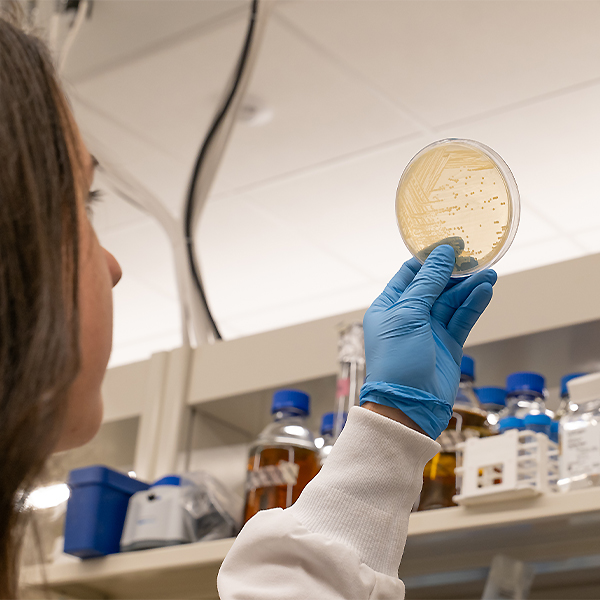
What I would say inspires me the most to do what I love to do every day would be the fact that I get to learn something new every day, whether it’s from my research directly or by communicating with other colleges in other fields in various scientific disciplines that fall under the One Health program.
Apart from learning and curiosity, what inspires me to do what I love is a sense of purpose. One Health is one simple way to make you feel like your research can make an impact on global issues like antimicrobial resistance, spread and surveillance of zoonotic diseases.
What are your plans after completing the One Health Ph.D. Program?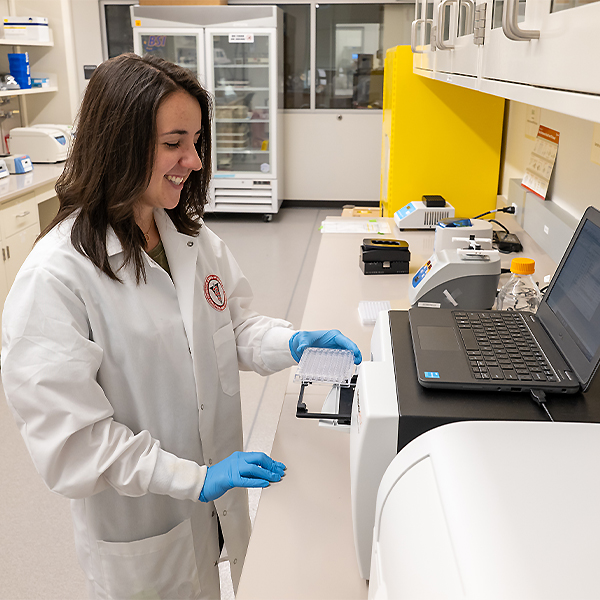
Throughout my time pursing my Ph.D., I’ve been lucky enough to work with several federal agencies that regulate food safety in the United States. With this said, I would love to reach out to those contacts after graduation and try to work with an agency to make data driven decisions to produce safer food in the United States.
Why did you choose Texas Tech?
I wanted to stay in Texas for college, and Texas Tech is known across the country for its commitment to academic excellence, research opportunities and interdisciplinary approach. When I first arrived to Texas Tech, I knew this was the place for me, as no other school gave me the same sense of community.
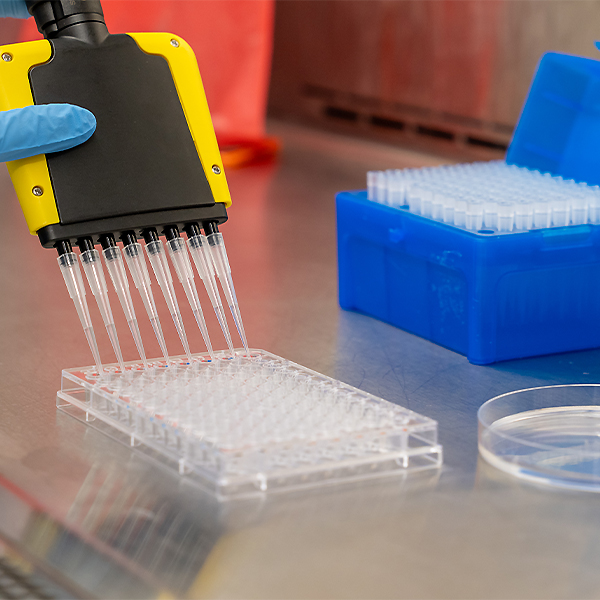
It was here I found my passion for food safety and realized how much of a nerd I was about microbiology while taking Dr. Alexandra Calle’s food microbiology class. It was also here I realized I wanted to pursue graduate school.
In fact, it was Dr. Calle who gave me the opportunity to complete my master’s degree and then asked me to stay to pursue my Ph.D.
While in graduate school, I have gotten to study subjects that truly interest me such as food safety interventions pre- and post- harvest, one of which allowed me to be part of a patent that is now published. Additionally, I have had the opportunity to travel nationally and internationally to present my research at conferences and to educate people in food safety. Last but not least, I have made some of the best friends while on this journey at Texas Tech.
How is it being part of the inaugural One Health Ph.D. class at the School of Veterinary
Medicine?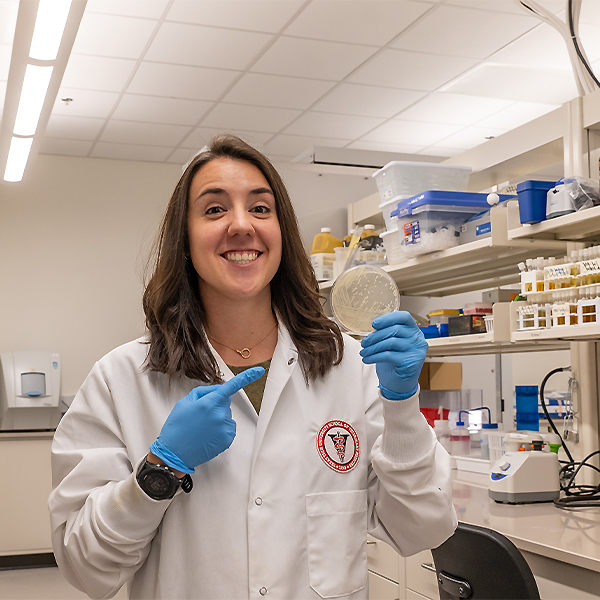
It is very exciting to be part of the inaugural class of a program that is the first of its kind. We as students get the chance to work directly with faculty to grow and improve the program for future cohorts.
The fact that we get to do this really highlights the School of Veterinary Medicine’s core value of community, as we are working towards the shared goal of creating a great program that wants to improve multisectoral and transdisciplinary research.
What is your research focus?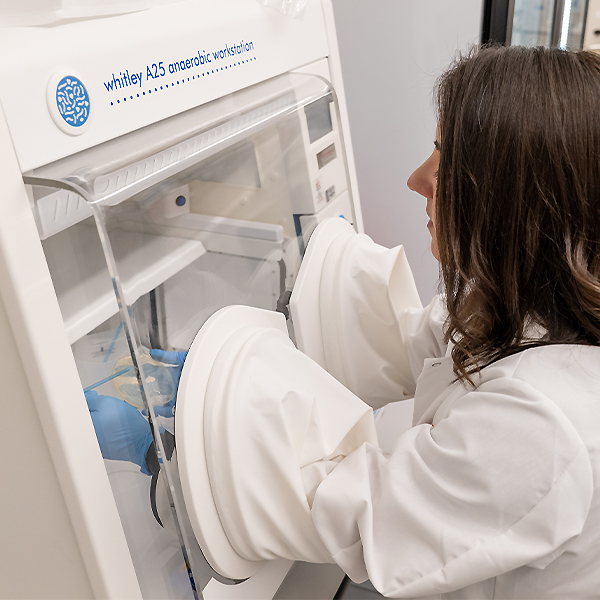
My research focus is food safety and applied microbiology. It is my job to create solutions to reduce pathogen load for the industry. I have focused on both pre-harvest, which means working at the farm level, and post-harvest, which means working at a food processing facility, interventions to reduce foodborne illnesses during my Ph.D.
Pre-harvest food safety acknowledges the fact that the health of humans, animals and the ecosystem are interconnected because food production involves all three. Pre-harvest food safety generally focuses on in-farm interventions to reduce pathogen shedding in food producing animals or in-farm interventions to increase hygienic conditions of a farm. Additionally, food safety measures at this point of production such as monitoring water quality for irrigation and ensuring cleanliness of farm equipment can help prevent contamination of crops with pathogens or harmful chemicals.
Post-harvest food safety focuses on interventions in the facility. The proper handling, storage, and processing of food should aim to reduce the risk of foodborne pathogen diseases in humans. This directly contributes to public health. Additionally, post-harvest interventions help mitigate the risk of zoonotic disease transmission through food products. This aligns with One Health particularly in the processing and handling of animal-derived foods.
Who is your mentor and how are you two working together?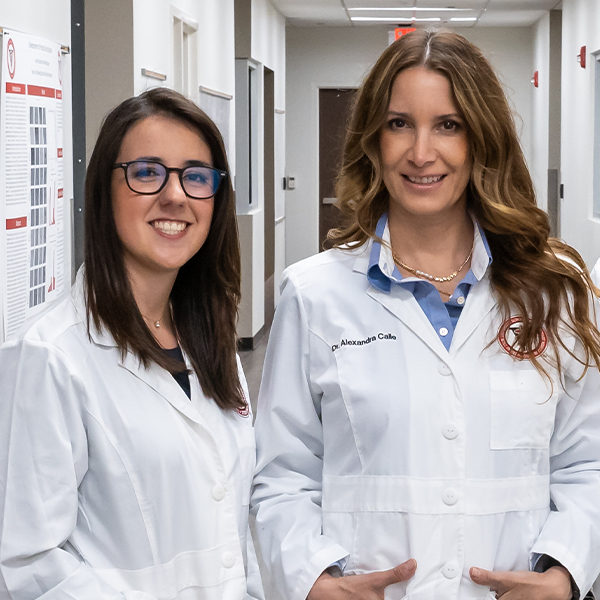
My mentor is Dr. Alexandra Calle. I have had the privilege of working with her ever since the fall of 2019 when I became part of her lab as an undergraduate researcher. She took me in after weeks of begging her for an opportunity because I really wanted to learn more about microbiology and how research was conducted.
Now, Dr. Calle and I work together to provide food safety solutions through microbiology research. Throughout my time working with her, I have had the opportunity to not just work in the lab, but also work in the field. Together we have taken on a project which involves capacity building in other countries which has allowed us to travel together.
These opportunities have given me the chance to learn so much from what goes on outside the lab. I have been in meetings with health departments of other countries and had the opportunity to audit food processing facilities. In those visits, I have seen Dr. Calle teach many people about food safety and how to implement food safety in their countries.
What are your favorite things to do outside of school?
Being in a Ph.D. program can be very demanding but I try to keep a balance between life and work. My two favorite things to do outside of school to disconnect a bit from work are baking and exercise.
Baking is a nice way to still include science but without pressure. Currently, my favorite things to bake are pastries. Even though it may not always turn our great at first, I love to cook complicated recipes because, as you know, practice makes perfect.
Some people might call me crazy, but I also enjoy competing in triathlons when I get a chance. In fact, I was president of the Texas Tech triathlon club during my undergrad, and I have continued training throughout graduate school. I have competed in races all around the country including a few Ironman competitions that were 70.3-mile-long races which is the longest distance I have done so far. I have also competed in the USA Triathlon Collegiate Nationals.
However, my all-time favorite race has been Escape from Alcatraz Triathlon in San Francisco, California. This race starts off in a ferry that is right by Alcatraz prison, and you have to swim to shore, then bike and run all over San Francisco. That race was one of the most challenging things I have ever done, it was definitely mind over body that got me through it which is why I love endurance sports.
I think endurance sports, in my case triathlon, can teach you really important life skills or lessons that you can then bring into your professional life. I always say that you get an “endurance sport mindset.” Things like, time management, discipline, mental toughness and goal setting are all skills that can make you a better professional and, in my case, a better scientist.
Tell us a little bit about your family. How has the culture you grew up around influenced you to be the person you are today?
While growing up, my family and I moved around a bit. I was born in Monterrey, Mexico which is a city in the northside of Mexico. When I was pretty young, we moved to the U.S., so it was definitely hard to adapt and be away from the rest of our family. However, we always try to visit Monterrey once a year during Christmas.
My parents have always been very adamant about us visiting the rest of the country. So, growing up we’d take trips to Mexico City, San Miguel de Allende, Oaxaca, Zacatecas and other historic places in Mexico. My family is also pretty active so we will do as many excursions as we can through some of the most beautiful places in Mexico such as Hierve el Agua in Oaxaca and La Huasteca Potosina among many others.
Since we moved to the U.S., my mom specifically has been very good about keeping the Mexican traditions in our household. For example, we were not allowed to speak English in the house, which turned out to be something I am grateful for because it allowed me to keep practicing my Spanish.
One of the things I remember most about the traditions we kept is celebrating Día de los Muertos. My mom always made an altar at the house where we put pictures of people who have passed away and it includes many elements, such as a person’s favorite food or drink and much more. Additionally, my dad keeps a collection of the best tequilas available, which are always a great addition to family gatherings.
When we moved to the U.S., we were kind of on our own. My parents always told us we had to rely on each other, and since I’m the oldest I had to set the example for my siblings. So, to do that, I’ve just tried to mirror what my parents taught me. My parents are the hardest working people I know, and they’ve always taught me to stand out and make people remember us in everything we do. In other words, make yourself indispensable. They always found the time to attend soccer games, triathlons, and thesis defenses. They showed this to me by being reliable in their professional lives and also in their personal lives.
By doing this, they taught me to show up for the things or people that you care about and to always do your best in everything you do. I’ve taken these lessons and have tried to apply them to every aspect of my life.
